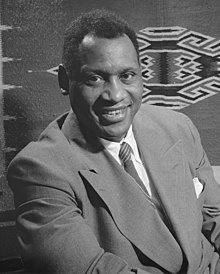
Back Paul Robeson Afrikaans بول روبسون Arabic بول روبسون ARZ পল ৰ'বচন Assamese پل روبسن AZB Paul Robeson Catalan Paul Robeson Czech Paul Robeson Welsh Paul Robeson Danish Paul Robeson German
Paul Robeson | |||||||||
|---|---|---|---|---|---|---|---|---|---|
 Robeson in 1942 | |||||||||
| Born | Paul Leroy Robeson April 9, 1898 Princeton, New Jersey, U.S. | ||||||||
| Died | January 23, 1976 (aged 77) Philadelphia, Pennsylvania, U.S. | ||||||||
| Resting place | Ferncliff Cemetery (Greenburgh, New York) | ||||||||
| Education | |||||||||
| Occupations |
| ||||||||
| Known for | Show Boat The Emperor Jones Othello All God's Chillun Got Wings | ||||||||
| Spouse | |||||||||
| Children | Paul Robeson Jr. | ||||||||
| Parents | |||||||||
| Relatives | Bustill family | ||||||||
|
American football career | |||||||||
 Robeson in football uniform at Rutgers, c. 1919 | |||||||||
| No. 21, 17 | |||||||||
| Position: | End / tackle | ||||||||
| Personal information | |||||||||
| Height: | 6 ft 3 in (1.91 m) | ||||||||
| Weight: | 219 lb (99 kg) | ||||||||
| Career information | |||||||||
| High school: | Somerville (NJ) | ||||||||
| College: | Rutgers | ||||||||
| Career history | |||||||||
| Career highlights and awards | |||||||||
| |||||||||
| Career NFL statistics | |||||||||
| |||||||||
Paul Leroy Robeson (/ˈroʊbsən/ ROHB-sən;[3][4] April 9, 1898 – January 23, 1976) was an American bass-baritone concert artist, actor, professional football player, and activist who became famous both for his cultural accomplishments and for his political stances.
In 1915, Robeson won an academic scholarship to Rutgers College in New Brunswick, New Jersey, where he was the only African-American student. While at Rutgers, he was twice named a consensus All-American in football and was elected class valedictorian. He earned his LL.B. from Columbia Law School, while playing in the National Football League (NFL). After graduation, he became a figure in the Harlem Renaissance, with performances in Eugene O'Neill's The Emperor Jones and All God's Chillun Got Wings.
Robeson performed in Britain in a touring melodrama, Voodoo, in 1922, and in Emperor Jones in 1925. In 1928, he scored a major success in the London premiere of Show Boat. Living in London for several years with his wife Eslanda, Robeson continued to establish himself as a concert artist and starred in a London production of Othello, the first of three productions of the play over the course of his career. He also gained attention in Sanders of the River (1935) and in the film production of Show Boat (1936). Robeson's political activities began with his involvement with unemployed workers and anti-imperialist students in Britain, and it continued with his support for the Republican cause during the Spanish Civil War and his involvement in the Council on African Affairs (CAA).
After returning to the United States in 1939, Robeson supported the American and Allied war efforts during World War II. His history of supporting civil rights causes and Soviet policies, however, brought scrutiny from the Federal Bureau of Investigation (FBI). After the war ended, the CAA was placed on the Attorney General's List of Subversive Organizations. Robeson was investigated during the McCarthy era. When he refused to recant his public advocacy of his political beliefs, the U.S. State Department withdrew his passport and his income plummeted. He moved to Harlem and published a periodical called Freedom,[5] which was critical of United States policies, from 1950 to 1955. Robeson's right to travel was eventually restored as a result of the 1958 United States Supreme Court decision Kent v. Dulles.
Between 1925 and 1961, Robeson released recordings of some 276 songs. The first of these was the spiritual "Steal Away", backed with "Were You There", in 1925. Robeson's recorded repertoire spanned many styles, including Americana, popular standards, classical music, European folk songs, political songs, poetry and spoken excerpts from plays.[6]
- ^ "Thorpe–M'Millan Fight Great Duel: Robeson Scores Both Touchdowns for Locals Against Indians". The Milwaukee Journal. November 20, 1922. p. 7.
- ^ Yowell, Keith (November 19, 2013). "Today in Pro Football History".
- ^ "Paul Robeson Quotations". Paul Robeson Centennial Celebration. Archived from the original on March 15, 2017. Retrieved March 15, 2017.
- ^ Vizetelly, Frank H. (March 3, 1934). "What's the Name, Please?". The Literary Digest: 11.
- ^ "Freedom". NYU Libraries. Archived from the original on March 15, 2022. Retrieved June 3, 2020.
- ^ "Resources About Paul Robeson (1898–1976)" Archived June 22, 2017, at the Wayback Machine, Paul Robeson Centennial Celebration. Retrieved June 12, 2017.